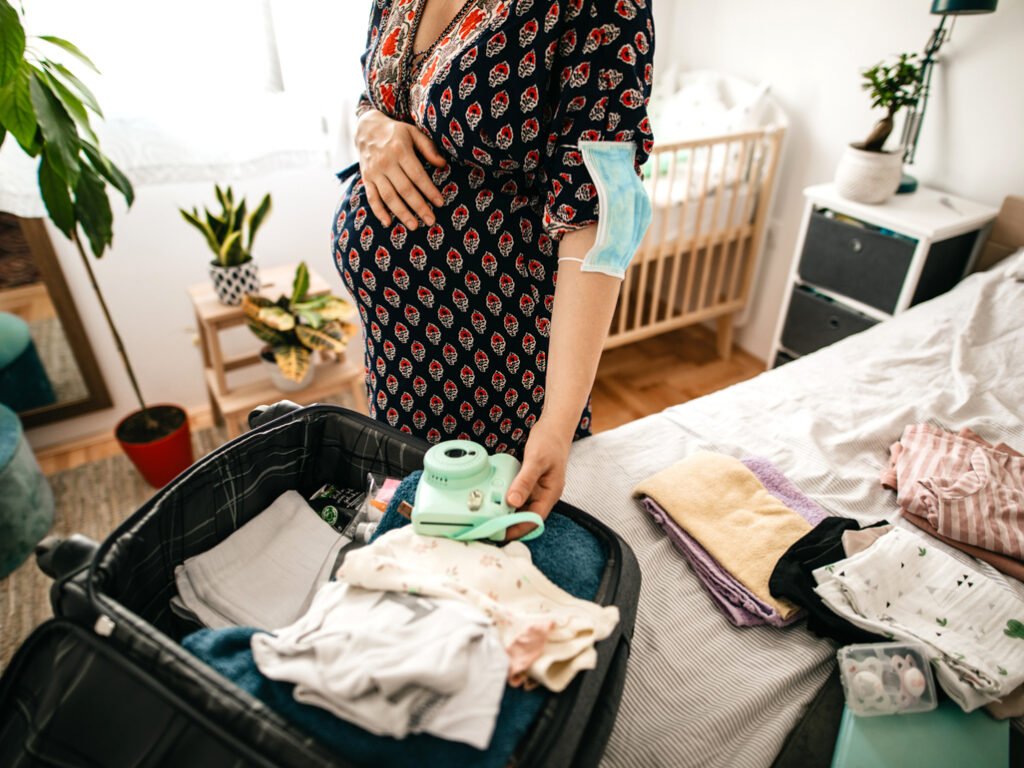With proper planning and consultation with your healthcare provider, traveling during pregnancy can be an enjoyable experience. Unless you have a high-risk pregnancy or specific complications, your healthcare provider will likely approve your travel plans. It is generally safe for most women to travel until the third trimester, although airlines usually restrict flying after 36 weeks, and many cruise ships prohibit travel after 24 weeks of pregnancy.

Is traveling while pregnant safe?
As long as you are not nearing your due date and do not have any serious pregnancy complications, it is generally safe to travel during pregnancy. However, it is important to take certain precautions and be aware of your specific needs. You may need to make more frequent restroom stops and consider additional comfort measures.
Before embarking on your trip, it is crucial to consult with your healthcare provider to ensure that it is safe for you to travel and that your chosen destination is suitable. It is advisable to avoid areas with a high prevalence of infectious diseases, such as regions with Zika or malaria outbreaks. Additionally, the ongoing COVID-19 pandemic has prompted people to reconsider their travel choices. While the CDC states that fully vaccinated individuals can travel, it is always recommended to seek guidance from your doctor before making any decisions.
It is important to consider that your usual activities may need to be modified during pregnancy. For instance, activities like Scuba diving lessons should be avoided, although snorkeling is generally considered safe.
Flying during pregnancy is generally safe, and most airlines permit domestic travel until around 36 weeks of pregnancy. However, it is essential to check with your airline regarding any specific rules or restrictions, especially for international flights. Your healthcare provider may advise against flying if you have certain health concerns that may require immediate medical attention or if you have uncontrolled health conditions. It is crucial to follow their guidance in such cases.
When to avoid pregnancy travel
Traveling while pregnant is generally not recommended if you have any health conditions that pose a risk to your well-being or the well-being of your baby. If you have any of the following conditions, it is highly likely that your doctor will advise against travel:
- Placental abruption: This is a serious condition where the placenta separates from the uterus before delivery.
- Preeclampsia: This is a pregnancy complication characterized by high blood pressure and damage to organs, typically affecting the liver and kidneys.
- Preterm or active labor: Traveling while experiencing preterm labor or being in active labor is not advisable.
- Cervical insufficiency (incompetent cervix): This refers to a weakened cervix that may lead to premature birth or miscarriage.
- Premature rupture of membranes (PROM): This occurs when the amniotic sac breaks before the 37th week of pregnancy.
- Suspected ectopic pregnancy: An ectopic pregnancy is when the fertilized egg implants outside the uterus, usually in the fallopian tube.
- Vaginal bleeding: Significant or unexplained vaginal bleeding during pregnancy requires immediate medical attention and is a reason to avoid travel.
In these situations, it is crucial to prioritize your health and follow your healthcare provider’s recommendations to ensure the safety of both you and your baby.
When is the best time to travel while you’re pregnant?
The optimal time for pregnancy travel is generally during the second trimester, which spans from around 14 weeks to 27 weeks. During this period, many women experience a reduction in morning sickness and fatigue that may have been present in the earlier stages of pregnancy. Furthermore, after 12 weeks, the risk of miscarriage significantly decreases.
The second trimester is advantageous for travel as it is less likely to be affected by the exhaustion and discomfort often associated with the third trimester. Your energy levels are likely to be higher, allowing you to engage in activities and sightseeing with relative ease. Moving around and traveling comfortably should still be manageable during this time.
However, it’s important to note that as you enter the third trimester, traveling may become more challenging. The physical demands of pregnancy can make it harder to move around and stay in one position for extended periods. It’s essential to consider your comfort and limitations during the later stages of pregnancy when planning any travel arrangements.
When should you stop traveling while pregnant?
The recommended timeline for ceasing travel during pregnancy depends on the mode of transportation. In general, it is advisable to conclude travel before reaching 36 weeks of pregnancy.
For air travel, most airlines allow pregnant women to fly domestically until they are 36 weeks pregnant. However, some airlines may have earlier restrictions for international travel. While the enforcement of these rules often relies on an honor system, it is wise to carry a doctor’s note from your healthcare provider, particularly if you are traveling in the third trimester.
In the case of cruise ships, many do not permit travel after 24 weeks of pregnancy. However, cutoff dates can vary among different cruise lines, so it is essential to verify their policies before booking a cruise.
Regarding road trips, there is no official deadline for when you must stop traveling. However, your personal comfort level, both physically and emotionally, as well as the advice of your doctor, can help guide your decision. You can generally drive until your due date, but as you approach full term, longer trips may become significantly less comfortable.
It is crucial to prioritize your well-being and follow the advice of your healthcare provider when deciding when to conclude travel during pregnancy.
Your pregnancy travel checklist
Before embarking on your trip while pregnant, it is important to take certain steps and precautions:
- Consult with your healthcare provider: Discuss your travel plans with your healthcare provider to ensure that it is safe for you to travel, and address any medical concerns specific to your pregnancy. Inform them about the activities you plan to engage in during your trip.
- Consider necessary vaccinations: If you are planning an international trip, inquire about any vaccines you may need for the destinations you will be visiting. Seek advice from your healthcare provider regarding appropriate vaccinations during pregnancy.
- Schedule around prenatal tests: Take into account your prenatal test schedule, including ultrasounds and other important screening tests, and plan your travels accordingly to ensure you can attend these appointments as needed.
- Choose an aisle seat: When flying, selecting an aisle seat can provide more comfort and easier access to stretch your legs or use the restroom on longer flights.
- Secure travel insurance: Consider purchasing travel insurance, including a policy with a “cancel for any reason” clause that provides coverage for cancelled trips beyond the standard policy terms. Check if your personal health insurance covers potential pregnancy complications while traveling internationally. Additionally, consider including evacuation insurance as part of your travel insurance plan.
- Gather medical records and information: Obtain a digital copy of your prenatal chart from your ob-gyn or midwife, which contains important information about your pregnancy. Keep a list of key names and emergency contact numbers on your phone and in written form.
- Plan for emergency care: Have a contingency plan in place for doctors and hospitals that accept your insurance at your destination, in case of early labor or pregnancy complications requiring urgent care.
- Pack necessary medications: Bring an adequate supply of prescription medications, prenatal vitamins, and over-the-counter remedies for the duration of your trip. Carry prescriptions in their original containers, and consider having a written prescription in case of loss or emergency.
- Prepare for unexpected situations: If going on a road trip, join an auto club that offers roadside assistance. Download necessary apps for car rentals and boarding passes in advance to facilitate rescheduling in case of last-minute cancellations.
- Verify airline policies: If flying during the third trimester, contact the airline to inquire about their cutoff week for pregnancy travel. Having a note from your doctor stating that you are cleared for travel is also beneficial during this stage.
By following these steps, you can ensure a smoother and more prepared travel experience during pregnancy.
During your trip
During your trip while pregnant, it’s important to take certain precautions and be aware of when to seek medical assistance:
- Stay hydrated and eat healthy: Drink plenty of water and maintain a balanced diet during your trip. Be cautious of consuming unpasteurized foods and drinks that may pose a risk of listeria contamination.
- Avoid risky foods: Steer clear of raw or undercooked meat and fish, drinks with ice from questionable sources, non-bottled water, and other foods that can lead to traveler’s diarrhea, which can be more problematic for pregnant women.
- Take regular breaks and wear seat belts: If traveling for long periods, whether by plane or car, take breaks to stretch and move around. Always wear your seat belt when seated.
- Consider maternity compression socks: These can provide relief for swollen feet and legs, both during transit and while exploring.
- Utilize assistance services: Many countries offer dedicated lines for pregnant travelers in shops and airports. Take advantage of shorter wait times if available.
- Be mindful of your limits: Recognize that pregnancy can affect your stamina, and don’t push yourself too hard. Allow for downtime and prioritize self-care during your vacation.
- Capture memories: Take photos of your baby bump during your travels. It can be a special way to reminisce and share experiences with your child in the future.
- Opt for comfortable shoes: Choose comfortable footwear, such as sneakers, to prioritize comfort and support during your pregnancy travels.
- Pack snacks: Carry snacks with you to satisfy hunger during waits at restaurants or when there are limited food options available.
- Enjoy the present: Be present and cherish moments with your travel companions. Once your baby is born, your focus and attention will shift, so make the most of your time together.
When to contact your doctor while traveling:
If you have any concerns or experience the following symptoms while traveling, promptly contact your doctor or healthcare provider:
- Vaginal bleeding
- Signs of preterm labor (such as constant low backache or bleeding)
- Ruptured membranes (water breaking)
- Severe cramping
- High blood pressure
- Severe nausea or vomiting
- Symptoms of COVID-19
Don’t hesitate to reach out for medical advice or seek emergency care if needed. Your doctor is the best resource for addressing any pregnancy-related concerns while traveling.






